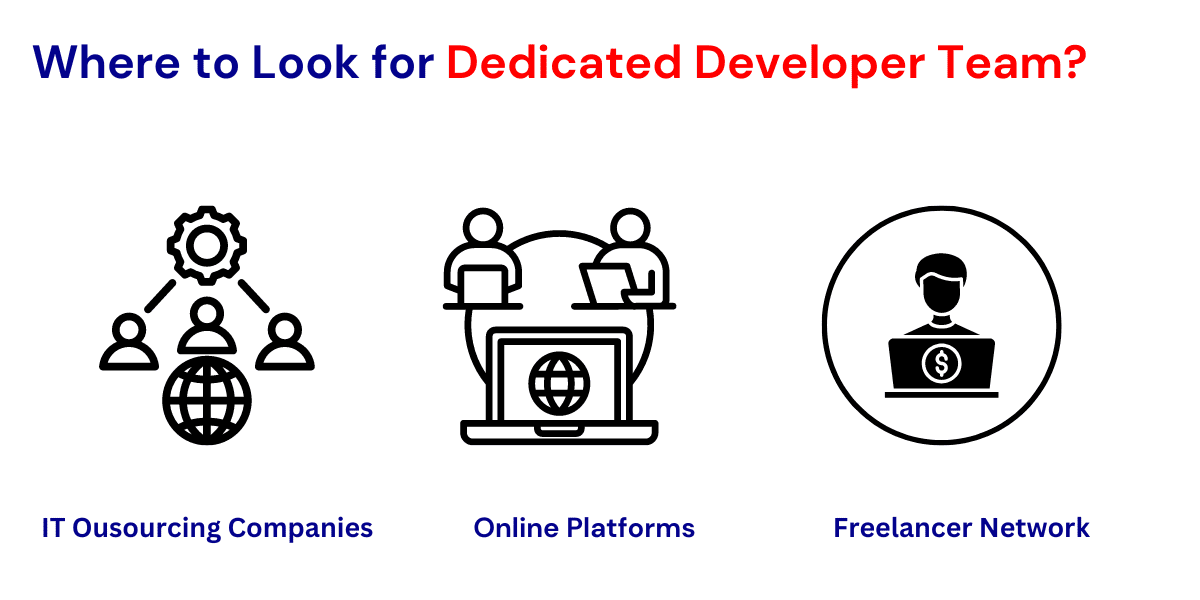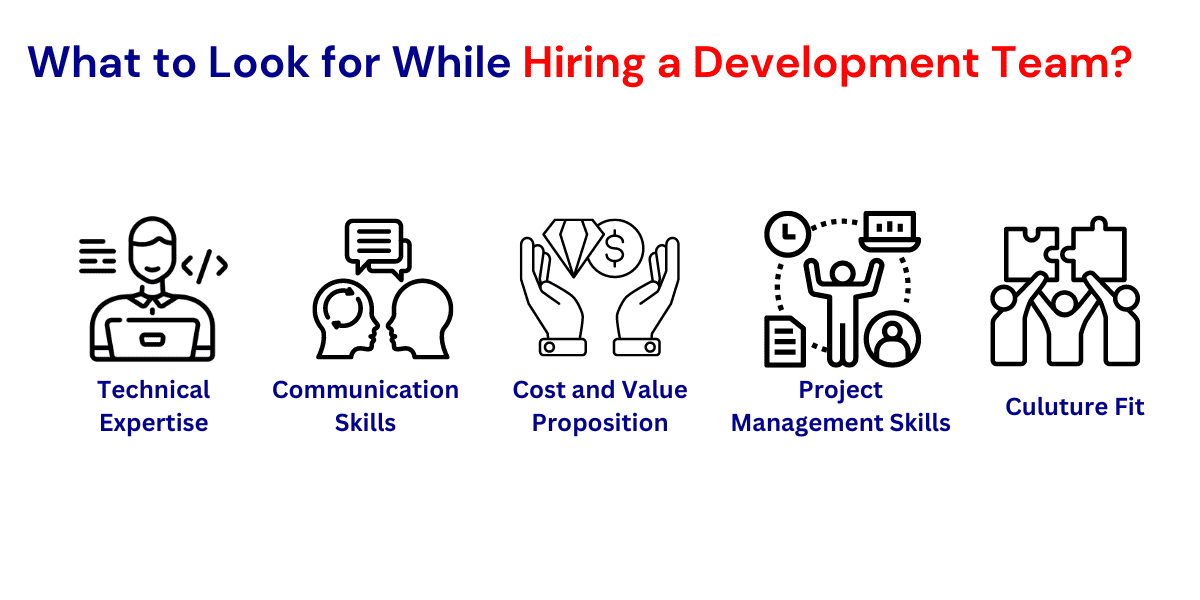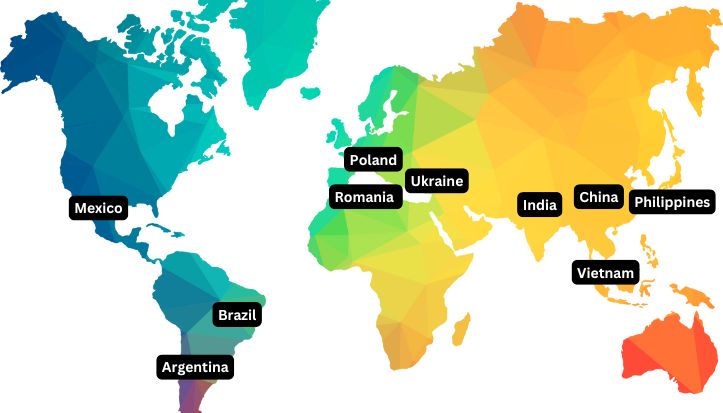
Businesses today are increasingly turning to IT outsourcing to scale their operations and drive growth. According to a recent report by Grand View Research, the global IT outsourcing market is expected to reach USD 937.6 billion by 2027, growing at a CAGR of 7.7% from 2020 to 2027. This shift is driven by the need for businesses to stay competitive, access specialized skills, and manage costs effectively. Outsourcing IT functions, especially hiring dedicated development teams, provides a streamlined and effective way for businesses to fast-track their digital transformation.
This blog aims to give you a deeper understanding of how to hire a dedicated development team and why it’s a strategic choice for entrepreneurs, the essential steps to build and manage such a team, and the pros and cons associated with this approach. Dive in to discover how this can be a game-changer for your organization.
What is a Dedicated Development Team?
A dedicated development team is a group of professionals exclusively working on a specific project for a client. This collaboration is akin to having an in-house team but without the overhead costs and logistical challenges. The client has full control over the project, including the ability to directly manage the team, set priorities, and adjust tasks as needed. This close collaboration ensures alignment with the client’s goals and fosters a cohesive working relationship, resulting in high-quality outcomes.
There are several models of dedicated software teams, each catering to different business needs. The most common models include:
Models of Dedicated Software Teams
A study by McKinsey found that companies can save up to 30% on IT costs by adopting dedicated team models. There are several models of dedicated software teams commonly used in the industry:
- Fully Dedicated Team: The team works only for you on long-term projects, ideal for large, ongoing work with changing requirements.
- Partially Dedicated Team: Team members split their time between your project and other tasks, suitable for projects that don’t need full-time resources but require specialized skills.
- Time and Material Model: You pay for the time and resources used. It’s flexible for projects with changing requirements.
- Fixed Price Model: Set cost for a defined project scope and timeline. It’s less flexible but budget-friendly.
Each of these models offers different levels of flexibility, control, and cost-efficiency, making it important to choose the one that best aligns with the project’s needs and goals.
When do You Need to Hire a Dedicated Development Team?
Knowing when to hire dedicated developers can be crucial for your project’s success. Here are key scenarios that indicate the need for such a team.
1. Early-stage Startups
For early-stage startups, hiring a dedicated development team can be a game-changer. Startups often face the challenge of building a product quickly while managing tight budgets. Hiring dedicated developers allows startups to rapidly scale their development efforts without the overhead costs associated with hiring in-house staff.
This setup also enables the in-house team to focus on core business activities while the dedicated team handles the development work, ensuring faster product development and time-to-market.
2. Projects with Vague Requirements
When working on projects with unclear or evolving requirements, a dedicated development team offers the flexibility needed to navigate through the discovery and development stages. These projects often require extensive research, iterations, and adjustments based on feedback.
A dedicated team provides the resources and stability needed to handle this fluidity, ensuring that the project evolves seamlessly without overspending or unnecessary delays.
3. Long-Term Projects
Long-term projects benefit significantly from a dedicated development team due to the consistent focus and commitment provided by such a model. These projects often require sustained effort and a deep understanding of the project’s goals and nuances.
A dedicated team can offer continuity, build accumulated knowledge over time, and adapt to changing project needs, making it easier to achieve long-term strategic goals.
4. Complex Projects
Enterprises undertaking complex projects with high technical demands and the need for continuous collaboration can greatly benefit from a dedicated team. This model ensures that the team remains focused and aligned with the project’s intricate requirements.
5. Variable Workloads
Companies experiencing fluctuating workloads can utilize a dedicated team to scale resources up or down as needed, ensuring efficient use of resources without the hassle of constant hiring and firing.
6. Specialized Skills
Projects requiring niche technical expertise that is not readily available in-house can leverage a dedicated team to access a diverse pool of specialized talent, ensuring high-quality outcomes and innovative solutions.
These scenarios highlight the versatility and advantages of hiring a dedicated development team, making it a strategic choice for various business needs and project types.
How to Build a Dedicated Development Team?
Where to Look for?
Finding the right dedicated development team is crucial for your project’s success. Here are some effective ways to find one.

1. Outsourcing Companies
IT Outsourcing companies offer the most robust solution for hiring dedicated development teams. These companies have a pool of pre-vetted professionals and provide end-to-end management of the development process. They handle administrative tasks, ensure high-quality standards, and offer flexibility to scale the team up or down as needed.
“Research by Clutch shows that 75% of companies that hired dedicated development teams reported improved project outcomes and higher satisfaction levels.”. This approach minimizes risks and maximizes efficiency, making it ideal for businesses looking to maintain control and ensure quality throughout the project lifecycle.
One such example is Softlabs Group. With over 20 years of experience and a presence in the USA, UK, Sweden, and India, Softlabs Group has completed over 5000 projects for clients in more than 25 countries. Their developers are known for their expertise, professionalism, and ability to deliver high-quality work within deadlines. Partnering with a reputable outsourcing company like Softlabs Group ensures you get dedicated developers who understand your project needs and can seamlessly integrate with your team.
2. Platforms
Various online platforms offer a wide range of remote developers, providing access to a global talent pool. However, these platforms often come with challenges such as variable quality and commitment levels.
- Upwork: A widely used platform where you can find freelance developers. While it offers a large pool of talent, the quality can vary significantly, and it often requires sifting through numerous profiles to find a suitable candidate.
- Toptal: Renowned for its rigorous screening process, Toptal provides access to top-tier developers. Although the quality is generally high, the costs can be substantially higher compared to other platforms.
- LinkedIn: An excellent tool for networking and finding developers, LinkedIn allows for direct connections and in-depth profile reviews. However, filtering through profiles to find the right candidate can be time-consuming and requires careful vetting to ensure they meet your requirements.
3. Freelance Networks
Freelance networks and tech communities are valuable resources for finding developers, especially those who prefer freelance work over full-time employment. Here are some platforms to consider:
- Freelancer.com: Similar to Upwork, Freelancer.com offers a large pool of freelance developers. However, the quality and commitment levels can vary, requiring thorough vetting to find the right candidate.
- GitHub: This platform allows developers to showcase their work through repositories and contributions. It’s a great place to find developers with specific skill sets, but assessing their reliability and availability requires additional effort.
- Stack Overflow Talent: This platform connects you with developers who are active in the tech community. While it’s a rich source of talent, it also demands careful evaluation of candidates to ensure they meet your project’s requirements.
Exploring these avenues can help you find skilled developers who fit your project needs. However, partnering with a reputable outsourcing company like Softlabs Group can offer a more streamlined and reliable solution, ensuring access to high-quality professionals with a proven track record.
What to look for?

When hiring a dedicated development team, it is essential to consider several key factors to ensure you get the best fit for your project:
- Technical Expertise Look for a team with strong technical skills that match your project requirements. Evaluate their proficiency in the necessary programming languages, frameworks, and tools. Check their previous work and project portfolio to assess their capability to handle complex tasks and deliver high-quality results.
- Communication Skills Effective communication is crucial for the success of remote teams. Ensure that the team members can articulate their ideas clearly and understand your requirements. Good communication minimizes misunderstandings and promotes a collaborative environment. Utilize platforms like Slack, Microsoft Teams, or Zoom to maintain regular and clear communication channels
- Cost and Value Proposition Assess the cost of hiring a dedicated developer team in relation to the value they bring to your project. While it’s important to stay within budget, the cheapest option is not always the best. Consider the overall value, including the team’s expertise, reliability, and ability to deliver on time. Compare rates from different regions and evaluate their cost-effectiveness relative to the quality of work they provide.
- Project Management Skills A dedicated team should possess strong project management skills to ensure smooth project execution. Evaluate their experience with project management methodologies like Agile or Scrum and their ability to use project management tools such as Jira or Trello. Effective project management ensures that timelines are met, and resources are used efficiently.
- Culture Fit Ensure the team aligns with your company’s culture and values. A good cultural fit can enhance collaboration and productivity. Look for a team that shares your work ethic, values, and professional norms. This alignment can lead to a more harmonious working relationship and better overall project outcomes.
By carefully considering these factors, you can select a dedicated development team that meets your project’s technical requirements and integrates well with your organizational culture and workflow. Based on this approach, Softlabs Group offers a dedicated development team full of experts in cutting-edge technologies such as AI, machine learning, and blockchain.
How to Evaluate?
Once you act on the above parameters, and define your needs, it’s time to evaluate them:
- Discuss Your Needs Clearly outline your project requirements, including technical skills, project scope, timeline, and budget. This initial discussion ensures that potential teams understand your expectations and can assess their ability to meet your needs.
- Review Portfolios and Case Studies Examine the team’s portfolio to see examples of their previous work. Look for projects similar to yours in complexity and scope. Case studies provide insights into their problem-solving approach, technologies used, and the outcomes achieved.
- Select CVs for Key Roles Request the CVs of team members who will be directly involved in your project. Review their educational background, certifications, and work experience to ensure they have the necessary expertise and relevant industry experience.
- Conduct Interviews Interview key team members to evaluate their technical skills and cultural fit. Ask about their previous projects, problem-solving approaches, and how they handle challenges. This helps ensure that they not only have
the technical capabilities but also align with your company’s values and work culture.
By following these steps, you can effectively evaluate and select a dedicated development team that is well-suited to your project’s specific requirements.
How to Manage a Dedicated Development Team?
Effectively managing a dedicated development team involves advanced strategies to ensure productivity, quality, and team engagement
1. Communication
Effective communication is the backbone of managing a global team. Regular meetings, clear communication channels, and asynchronous updates ensure everyone stays aligned, regardless of time zones.
- Regular Meetings: Schedule daily or weekly meetings to keep everyone aligned.
- Clear Channels: Use tools like Slack, Microsoft Teams, or Zoom for effective communication.
- Asynchronous Communication: Utilize asynchronous updates to accommodate different time zones.
2. Workflow and Productivity
- Task Management: Implement task management tools like Jira, Trello, or Asana.
- Deep Work Sessions: Encourage uninterrupted work periods using techniques like Pomodoro.
- Retrospectives: Hold regular retrospectives to identify and fix workflow issues.
3. Performance Monitoring
- Metrics: Define and track performance metrics that align with project goals.
- Regular Reviews: Conduct quarterly performance reviews to provide feedback and set new goals.
- Quality Assurance: Regularly update and maintain automated tests to ensure code quality.
4. Team Motivation and Engagement
- Recognition: Acknowledge and celebrate team achievements.
- Growth Opportunities: Provide access to learning resources and varied tasks.
- One-on-One Meetings: Hold individual meetings to address concerns and discuss career development.
5. Addressing Challenges
- Proactive Problem-Solving: Regularly check for issues and use root cause analysis.
- Clear Escalation Paths: Ensure there are clear paths for escalating unresolved issues.
- Risk Assessments: Conduct periodic risk assessments and develop strategies to handle them.
6. Continuous Improvement
- Feedback Loops: Set up ongoing feedback mechanisms for both processes and products.
- Innovation Time: Allow time for team members to experiment with new tools and ideas.
- Learning Sessions: Hold regular sessions where team members share knowledge and successful strategies.
With this checklist, managing your global dedicated development team can become more structured and efficient. By focusing on these key areas, you’ll foster a productive, motivated, and cohesive team ready to tackle any challenge.
Wrapping Up
By leveraging a dedicated team, businesses can maintain a sharp focus on core activities while ensuring high-quality outcomes in their development projects. Throughout this blog, we’ve explored the importance of dedicated development teams, the different models available, and the scenarios where hiring such a team makes the most sense. We’ve discussed how to build and manage a dedicated team, from selecting the right outsourcing partners and using various platforms to finding the best developers.
Partnering with a reputable outsourcing company like Softlabs Group further simplifies the process of managing and collaborating with a dedicated development team. Clutch reviews show that Softlabs Group has a client satisfaction rate of 92%, with clients praising their streamlined approach with a pool of pre-vetted professionals, ensuring high-quality work delivered within deadlines.
Take a look at some recent case studies developed by Softlabs Group to solve business problems for their clients!




